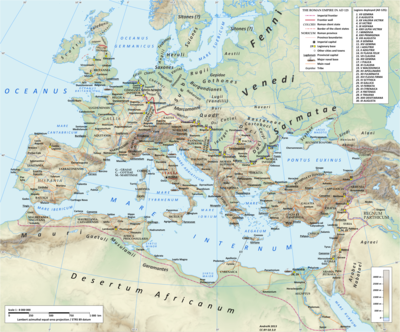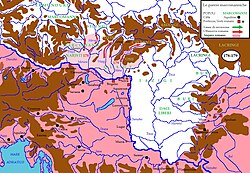Marcomanni

The Marcomanni were a Germanic people[1] that established a powerful kingdom north of the Danube, somewhere near modern Bohemia, during the peak of power of the nearby Roman Empire. According to Tacitus and Strabo, they were Suebian.
Origin
It is believed their name may derive from
The Marcomanni first appear in historical records as confederates of the
According to the accounts of
In the late first century, Tacitus mentions (Germania I.42) the Marcomanni as being under kings appointed by Rome.[6]
Marcomannic Wars


In the second century AD, the Marcomanni entered into a confederation with other peoples, including the
Later history


The
After crossing the Rhine in 406 and the
There, Hermeric swore fealty to the emperor in 410. Bracara Augusta, the modern city of Braga in Portugal, had been the capital of Roman Gallaecia and now became the capital of the Suebic Kingdom.
The Danubian area, meanwhile, became the core of
According to historians such as Herwig Wolfram:
The Marcomanni and the Quadi gave up their special names after crossing the Danube, in fact both the emigrants and the groups remaining in Pannonia became Suebi again. The Pannonian Suebi became subjects of the Huns. After the battle at the Nadao they set up their kingdom, and when it fell, they came, successively under Herulian and Longobard rule, south of the Danube under Gothic rule, and eventually again under Longobard rule.[8]
There is a
Kings
- Maroboduus, c. 9 BC – 18 AD[9]
- Catualda, 18 – 20[9]
- Vannius, 20 – c. 50[10]
- Vangio and Sido, c. 50 – ?[11]
- Ballomar, c. 166? – 172 or 178?
- Attalus, c. 260/2[12]
- Fritigil, mid-4th century, queen
See also
- History of Portugal
- History of Spain
- Irminones
- List of ancient Germanic peoples
- Migrations period
- Timeline of Germanic kingdoms
References
- ^
- Schehl, Franz A. W.; ISBN 9780191735257. Retrieved January 26, 2020.
Marcoman(n)i... a west German (Suebic) tribe, the name meaning the inhabitants of a border country ('march')...
- ISBN 9780191727139. Retrieved January 25, 2020.
Marcomanni. 'Border Men', a Germanic people...
- Fischer, Thomas; Nicholson, Oliver (2018). "Marcomanni". In Nicholson, Oliver (ed.). The Oxford Dictionary of Late Antiquity. ISBN 9780191744457. Retrieved January 26, 2020.
Marcomanni. Germanic tribe belonging originally to the Elbe cultural grouping...
- Schehl, Franz A. W.;
- ^ "mark - Origin and meaning of the name mark by Online Etymology Dictionary". etymonline.com. Archived from the original on 12 July 2017. Retrieved 7 May 2018.
- ^ "man - Origin and meaning of man by Online Etymology Dictionary". etymonline.com. Archived from the original on 27 September 2017. Retrieved 7 May 2018.
- ^ Smith, William (1854), Dictionary of Greek and Roman Geography, archived from the original on 2013-11-20
- ISBN 9781843839156, archivedfrom the original on 2016-04-22
- ^ "Tacitus: Germany: Book 1 [40]".
- ^ Herwig Wolfram, "History of the Goths", p.266 Archived 2016-05-08 at the Wayback Machine
- ^ The Roman Empire and Its Germanic Peoples, pp. 160–161.
- ^ a b Tac. Ann. 2.62-3
- ^ Tac. Ann. 2.63; 12.29–30
- ^ Tac. Ann. 12.29-30
- ^ Aur. Vict. Caes. 33,6; Epit. 33,1; SHA Gall. 21,3; PIR2 A 1328; PLRE I Attalus
Classical sources
- Caesar De Bello Gallico, at The Latin Library
- Tacitus Germania, at The Latin Library
- Tacitus Annales, at The Latin Library
External links
- . Encyclopædia Britannica (11th ed.). 1911.
